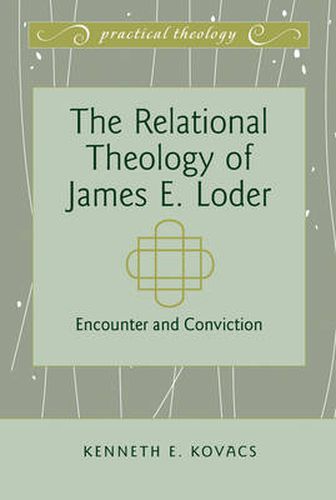Readings Newsletter
Become a Readings Member to make your shopping experience even easier.
Sign in or sign up for free!
You’re not far away from qualifying for FREE standard shipping within Australia
You’ve qualified for FREE standard shipping within Australia
The cart is loading…






This title is printed to order. This book may have been self-published. If so, we cannot guarantee the quality of the content. In the main most books will have gone through the editing process however some may not. We therefore suggest that you be aware of this before ordering this book. If in doubt check either the author or publisher’s details as we are unable to accept any returns unless they are faulty. Please contact us if you have any questions.
The work of practical theologian James E. Loder, Jr. (1931-2001) deserves a wider audience. For more than forty years, he developed and exercised an interdisciplinary methodology that identified patterns of correlation in the fields of psychology, educational theory, phenomenology, epistemology, and physics, producing a compelling theological vision that centers on the person and work of the Holy Spirit engaging and transforming human life. At his untimely death in November 2001, Loder was the Mary D. Synnott Professor of Philosophy of Christian Education at Princeton Theological Seminary, where he lectured primarily in the areas of human development and the philosophy of education.
This book introduces and examines, explores and untangles the complexity of Loder’s thought in order to make it more accessible to a broader audience. At the core of Loder’s work is a relational phenomenological pneumatology of inestimable value to the theologian engaged in the ongoing renewal of the church. The Christian life is preeminently relational, distinguished by a relationship with God constituted by Jesus Christ, and sustained by the Holy Spirit. Relationality, Loder claims, takes place in and through the life of the Holy Spirit who operates within a complementary relationship with the human spirit, through an analogia spiritus: a profound, transformational interrelation of the Holy Spirit and the human spirit. The Holy Spirit, intimately connected to the person and work of Christ, takes up and extends the work begun in the incarnation by enfleshing the presence of Christ, thus transforming human life. Loder is distinctive for articulating a pneumatology that incorporates ‘how’ the self participates in the relationship and the way the self, through the relationship, comes to have a full knowledge of itself, the world, and God. It is precisely the logic of this Christomorphic dynamic that has extraordinary implications for the way we attempt to fathom the depths and convey the meaning of Christian experience. Loder’s relational phenomenological pneumatology contains rich and principally unrecognized resources for providing new frameworks for the Christian life.
$9.00 standard shipping within Australia
FREE standard shipping within Australia for orders over $100.00
Express & International shipping calculated at checkout
This title is printed to order. This book may have been self-published. If so, we cannot guarantee the quality of the content. In the main most books will have gone through the editing process however some may not. We therefore suggest that you be aware of this before ordering this book. If in doubt check either the author or publisher’s details as we are unable to accept any returns unless they are faulty. Please contact us if you have any questions.
The work of practical theologian James E. Loder, Jr. (1931-2001) deserves a wider audience. For more than forty years, he developed and exercised an interdisciplinary methodology that identified patterns of correlation in the fields of psychology, educational theory, phenomenology, epistemology, and physics, producing a compelling theological vision that centers on the person and work of the Holy Spirit engaging and transforming human life. At his untimely death in November 2001, Loder was the Mary D. Synnott Professor of Philosophy of Christian Education at Princeton Theological Seminary, where he lectured primarily in the areas of human development and the philosophy of education.
This book introduces and examines, explores and untangles the complexity of Loder’s thought in order to make it more accessible to a broader audience. At the core of Loder’s work is a relational phenomenological pneumatology of inestimable value to the theologian engaged in the ongoing renewal of the church. The Christian life is preeminently relational, distinguished by a relationship with God constituted by Jesus Christ, and sustained by the Holy Spirit. Relationality, Loder claims, takes place in and through the life of the Holy Spirit who operates within a complementary relationship with the human spirit, through an analogia spiritus: a profound, transformational interrelation of the Holy Spirit and the human spirit. The Holy Spirit, intimately connected to the person and work of Christ, takes up and extends the work begun in the incarnation by enfleshing the presence of Christ, thus transforming human life. Loder is distinctive for articulating a pneumatology that incorporates ‘how’ the self participates in the relationship and the way the self, through the relationship, comes to have a full knowledge of itself, the world, and God. It is precisely the logic of this Christomorphic dynamic that has extraordinary implications for the way we attempt to fathom the depths and convey the meaning of Christian experience. Loder’s relational phenomenological pneumatology contains rich and principally unrecognized resources for providing new frameworks for the Christian life.